As the US Congress, the FBI, and newly appointed special counsel Robert Mueller probe the nest of activities around Russian interference in US politics, a lot of people are asking the same question: Why didn’t we know about all of this before the presidential election?
If it turns out that there was a major Russian role in the outcome of the election, much of the US media, some members of Congress, and even leaders in the Obama White House may have to admit that they had fair warning. As with so many other disasters, from the Sept. 11 terrorist attacks to Hurricane Katrina and the Fukushima nuclear plant meltdowns, a lot of powerful people ignored an expert who very clearly told us what was coming.
Christopher Steele, a UK expert on Russia and formerly the head of British Secret Service (Mi6) efforts against Russia, drafted a detailed “dossier” on then-candidate Trump. The dossier alleges details of Trump’s activities in Russia, and claims that Trump had a compromising relationship with the Kremlin and that Russia worked with the Trump campaign to skew the election. That dossier was then presented to many US mainstream media organizations, but editors declined to run the stories because of their inability to fully verify its contents. Voters never heard about the allegations until the election was over.
Now, rumors coming out of the FBI and Department of Justice investigations suggest that parts of what Steele alleged may actually be true. Was there a conspiracy of silence among news editors in order to support the Trump campaign? No. But why was Steele’s warning ignored?
Looking at numerous recent disasters, we found that there was frequently an expert who had valid data and who warned about the impending calamity in advance. In each case, that expert’s warnings went unheeded. We call those experts Cassandras, after the mythical figure cursed by the gods to see future calamities, yet never believed. The disasters that might have been averted we call “Cassandra Events.” So, were Christopher Steele’s warnings about candidate Trump a Cassandra Event? We can look at the factors below to decide.
First, the warning is often about something that had never happened before. And so decision makers exhibit “First Occurrence Syndrome,” the failure to take seriously a warning about a possibility with which they had no prior experience. The dikes in New Orleans had never failed, but when they did, the whole city was flooded. No foreign power had ever tried seriously to change the outcome of a US election with their own concerted intelligence operation, but if Russia did indeed try, well, they may have soaked some voters, just like Katrina’s waves topped the New Orleans levees.
The second factor we have repeatedly found is that the person giving an accurate warning is often an expert armed with data, but who is also an outlier in their field. Other experts were not giving the same warning. What we found in most of the disasters we reviewed was that the expert exhibited “Sentinel Intelligence,” meaning that they had a unique ability to spot an approaching problem well before others.
Former US ambassador Robert Ford accurately predicted the rise of ISIL two years before it happened and well before other analysts. Winston Churchill foresaw the threat of the Nazis and was mocked as a war monger by other British leaders. Roger Boisjoly and other Morton-Thiokol engineers screamed warnings that the space shuttle Challenger would explode on take-off on a cold January morning in 1986. And indeed, many experts on Russia and cyberattacks now agree with what Steele said a year ago, that Russia systemically interferes in democratic elections using sophisticated data analysis, amplified phony news stories, and false on-line identities in social media.
The third factor is that the disaster being foretold sounds “outlandish,” more like the plot for a Hollywood movie than something that would happen in the real world. NASA astrophysicist David Morrison has warned for years about the danger from large asteroid impact with Earth, but often had difficulty being taken seriously because two popular science fiction movies were the first most people heard of this risk. What Steele described in his “dossier” sounded like a plot outline for an updated version of the movie The Manchurian Candidate.
Fourth, the Cassandra is often assailing a highly respected person or who may have the presumption of being reputable. Harry Markopolos was an unknown Boston financial analyst who repeatedly and accurately warned the Securities and Exchange Commission that Bernie Madoff was running a Ponzi scheme, a fraud that would take billions of dollars from unsuspecting investors. But Madoff was a highly respected figure on Wall Street, the chairman of NASDAQ. Donald Trump was a famous television star and real estate mogul who had won most of the Republican presidential primaries.
Finally, often the issue involved in the warning is arcane and complex, not easily explained or understood outside of an expert community. Joe Weiss warned for years that connecting something called an “Industrial Control System” of the critical infrastructure to the internet would create vulnerabilities hackers could use to shut down electric power grids and disrupt the Internet of Things. Then in 2015, someone did exactly that to the Ukrainian power grid. Russian tactics called “kompromat” and “disinformatia” using big data analytics and computer bots to manipulate social media seemed complex and fairly removed from what we previously knew about American election campaigns.
To be clear, we don’t know yet whether Steele’s dossier on the Russia-Trump connections and activities was largely right. But if it was, we will be faced with yet another example of our failure to heed real-life Cassandras. Regardless, we need to admit to ourselves that we are simply dreadful at spotting Cassandra Events, so that we can figure out how to be less blind to the next warning.
